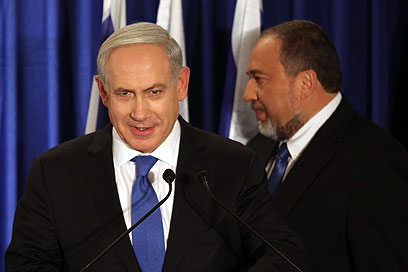

The Israeli political area was still reeling from the shockwaves sent through it by Prime Minister Benjamin Netanyahu and Yisrael Beiteinu Chairman Avigdor Lieberman, who announced that their parties would by vying for the public's vote in the upcoming election under one ticket, when senior Likud members began questioning Lieberman's true motives for the move.
According to Likud sources, Lieberman agreed to join forces with the Likud as means of paving his way to the Prime Minister's Office.
Related stories:
- Netanyahu, Lieberman join forces ahead of elections
- Shas hopes to gain more votes after merger
Op-ed: Likud is the new Labor
Lieberman, once a Likud strongman, has been able to maintain a significant influence on the party even after he left and formed Yisrael Beiteinu.
"Lieberman understands that he and Yisrael Beiteinu have reached the glass ceiling when it comes to realizing potential mandates," a top Likud source said Friday.

Secret agenda? Netanyahu and Lieberman (Photo: EPA)
"It's not enough (seats) for him to become prime minister. That's why he decided to opt for a unity deal that would make him the No. 2 man in the (Right) bloc. It means that he will become the successor when the No. 1 man steps down.
"Lieberman understands that. I'm not sure Bibi does," the source said.
- For full coverage of the elections click here
Channel 2's senior political analyst Amnon Abramovich reported Thursday that deal harbors a secret rotation clause, saying that Netanyahu will act as PM for the government's first three years and will then step aside and have Lieberman take over.
Lieberman was quick to deny the report: "There's no rotation agreement. I'm endorsing Netanyahu for a full four-year term," he told Ynet and Yedioth Ahronoth.
Asked about the possibility of eventually succeeding Netanyahu, the foreign minister said: "I'm no heir apparent and I don’t deal with hereditaments. I'm focusing on our shared victory in the coming election.
"Uniting the true national camp is the right thing to do. I hope we can reach 50 mandates in the elections – it doesn’t have to be a dream.
"As far as I'm concerned, what matters most is governmental stability. You have to understand that this move is meant to promote a far-reaching governmental reform."
'No more political horse trading'
A close associate of the foreign minister's said that the parties' merger means to "first and foremost change the system of government and prevent the smaller parties from blackmailing the government. There will be no more coalitional horse trading."
Lieberman is said to back the Norwegian government model of 18 ministers. "This will enable a true reform. We would be able to form a government with only one or two more parties," the associate added.
Lieberman told Ynet and Yedioth Ahronoth that he was undeterred by the possibility of the Center and Left parties joining forces ahead of the elections.
"At the end of the day, there's no choice, really. We need big political parties in Israel," he said. "We're all for having two major parties."
What could have been the perfect political coup, however, is clouded by one substantial question mark: Lieberman is still waiting for Attorney General Yehuda Weinstein decision on whether or not he will be indicted on several cases.
A potential indictment against the foreign minister may include charges of fraud, breach of trust, money laundering, fraudulently obtaining benefits and harassing witnesses.
Weinstein was supposed to announce his decision in early September, but has so far failed to do so.
Yuval Karni and Itamar Eichner are
Ynet and Yedioth Ahronoth correspondents
- Receive Ynetnews updates
directly to your desktop















